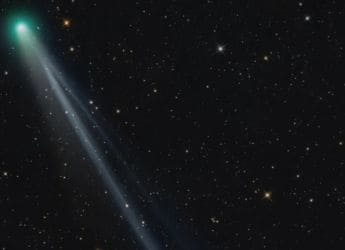- Home
- Science
- Science News
- Pulsar Observations Could Reveal Gravitational Wave Interference From Black Holes
Pulsar Observations Could Reveal Gravitational Wave Interference From Black Holes
Pulsars’ rhythmic signals may help detect gravitational-wave “beats” from merging supermassive black holes.

Photo Credit: Wikimedia Commons
Pulsar timing may reveal gravitational-wave beats from supermassive black hole pairs
Astronomers may soon be able to “hear” gravitational-wave beats through the rhythmic pulses of distant neutron stars. A new study suggests that subtle timing shifts in pulsars—nature's most precise cosmic clocks—could reveal interference between gravitational waves of nearly identical frequencies, offering a fresh way to trace supermassive black hole pairs across the universe. The research could help determine whether last year's detected ultra-low-frequency signals come from many distant sources or a nearby binary system.
Pulsar Timing May Reveal Gravitational-Wave ‘Beats' from Merging Supermassive Black Holes
According to findings published in the Journal of Cosmology and Astroparticle Physics, theoretical physicist Hideki Asada and researcher Shun Yamamoto from Hirosaki University proposed the method after analysing pulsar timing data.
They suggest that when two supermassive black hole binaries emit waves at almost the same frequency, their interference produces a “beat pattern”, which can appear as periodic variations in pulsar timing. Detecting these patterns would allow to weed out sources against a background cosmic appearance in nature
Indeed, a handful of international collaborations, such as NANOGrav and some European groups with which Asada is involved but cannot publicly discuss at this time. They have already seen strong hints of nanohertz gravitational waves — albeit not with the high-significance five-sigma discovery threshold. When it is confirmed, scientists think the next step is to trace out exactly where these ripples in spacetime are coming from.
The proposed technique could become crucial as observatories refine pulsar data in the coming years. Scientists anticipate that confirmed detections will not only validate these faint cosmic rhythms but also reveal new insights into the merging of distant galaxies.
For the latest tech news and reviews, follow Gadgets 360 on X, Facebook, WhatsApp, Threads and Google News. For the latest videos on gadgets and tech, subscribe to our YouTube channel. If you want to know everything about top influencers, follow our in-house Who'sThat360 on Instagram and YouTube.
Related Stories
- Samsung Galaxy Unpacked 2025
- ChatGPT
- Redmi Note 14 Pro+
- iPhone 16
- Apple Vision Pro
- Oneplus 12
- OnePlus Nord CE 3 Lite 5G
- iPhone 13
- Xiaomi 14 Pro
- Oppo Find N3
- Tecno Spark Go (2023)
- Realme V30
- Best Phones Under 25000
- Samsung Galaxy S24 Series
- Cryptocurrency
- iQoo 12
- Samsung Galaxy S24 Ultra
- Giottus
- Samsung Galaxy Z Flip 5
- Apple 'Scary Fast'
- Housefull 5
- GoPro Hero 12 Black Review
- Invincible Season 2
- JioGlass
- HD Ready TV
- Laptop Under 50000
- Smartwatch Under 10000
- Latest Mobile Phones
- Compare Phones
- Honor Magic 8 Pro
- Honor Magic 8
- Moto X70 Air
- Moto G100 (2025)
- Vivo X300 Pro
- Vivo X300
- Samsung W26
- Samsung Galaxy M17 5G
- MacBook Pro 14-inch (M5, 2025)
- Asus Vivobook S16 (S3607QA)
- Apple iPad Pro 13-inch (2025) Wi-Fi + Cellular
- Apple iPad Pro 13-inch (2025) Wi-Fi
- Honor Watch 5 Pro
- Vivo Watch GT 2
- Xiaomi Xiaomi TV S Pro Mini LED 55 2026
- Xiaomi TV S Pro Mini LED 65 2026
- Asus ROG Ally
- Nintendo Switch Lite
- Haier 1.6 Ton 5 Star Inverter Split AC (HSU19G-MZAID5BN-INV)
- Haier 1.6 Ton 5 Star Inverter Split AC (HSU19G-MZAIM5BN-INV)

















